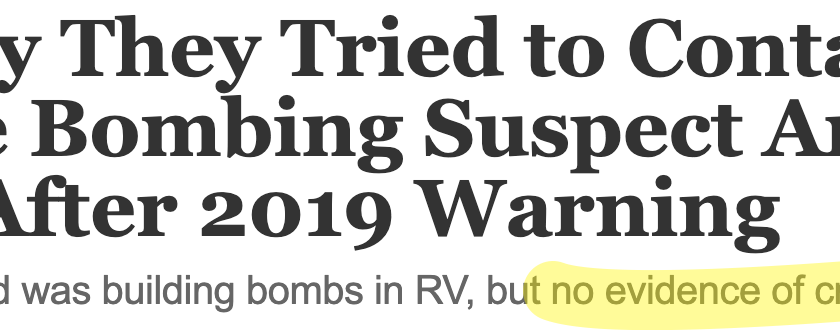
The Nashville bomb attack on Christmas morning 2020 exposes the fundamental flaws and the urgent need to revolutionize community safety. We know, based on the post-event reporting, that the Nashville attack should have never happened, and yet it did. How many more tragedies have to happen before calls to revolutionize community safety and prevention result in real action?
Since attacks like Columbine in 1999 and 9-11 in 2001, thousands of attacks have occurred even though the at-risk individuals responsible for the attacks exhibited concerning behaviors, warning signs, and pre-incident indicators that community members observed and reported days, weeks, and months before the attack.
Too many fundamental flaws have resulted in preventable attacks not being prevented and countless lives lost, lives ruined, reputations damaged, huge lawsuits, soaring costs, and numerous other unwanted and unnecessary consequences.
The recent Nashville attack exposes numerous common and fundamental flaws in conventional community safety, policing strategies, and proactive prevention:
- Numerous attacks have been executed by individuals who are not criminals and not on law enforcement’s radar. Similar to Las Vegas Massacre and others.
- In almost every attack, concerning behaviors were exhibited, observed, and reported by community members, but intervention actions failed because the information was scattered.

- Law enforcement (no matter how good they are) cannot do much if the concerning behaviors are not a crime.

- Law enforcement lacks secure, trusted, community-based tools for sharing non-criminal concerning behaviors with a community-based Threat Assessment Team(s).

- More and more community members believe law enforcement is not responsive and not doing their job and then do not report concerning behaviors in the future.
- More and more community members distrust law enforcement and are not comfortable contacting law enforcement with concerning behaviors.
- At-risk individuals know if they do not commit a crime, their opportunity to plan and attack will be much easier because law enforcement is not a threat to them.
- Local and State government leaders are putting most (if not all) of their focus on existing strategies and tools for responding, recovering, and rebuilding, unaware of new strategies and tools to proactively keep communities safe.
- And others…
According to reports (and seen in the headlines above), the girlfriend of the Nashville bomber notified Nashville police in 2019, 16 months before the attack, saying he “was building bombs in the RV trailer at his residence”. The Nashville police went to the home of the boyfriend and knocked on the door but “they saw no evidence of a crime and had no authority to enter his home or fenced property”. The Nashville police sent the report to the FBI, but the FBI reported they found no records on the boyfriend. The boyfriend then fell off the radar of law enforcement and was essentially allowed to escalate and build the bombs with no intervention or disruption from anyone.
The Nashville bomber is one of several attackers that law enforcement knew about, but because no crime was committed no further actions were taken. This is a dangerous fundamental flaw as there are many other resources that could have and should have acted! This is just one of the many flaws and reasons why community safety must be revolutionized.
Fundamental flaws like the one above become even more dangerous as the number of at-risk individuals in communities across the USA are soaring as stressors and grievances are increasing (pandemic, politics, social justice, police, hate crimes, etc.).
Prevention failure is one of the biggest problems with community safety.
Prevention success is one of the biggest game-changers with community safety.
To achieve more prevention successes, community leaders will need to be open-minded to new community-driven strategies and new tools that will help eliminate long-standing fundamental flaws.